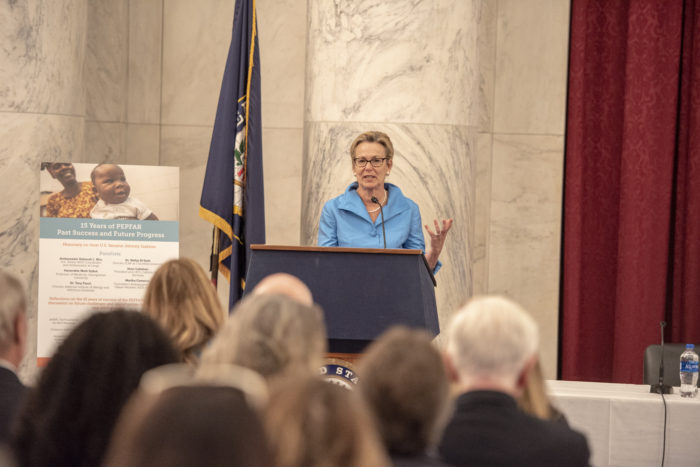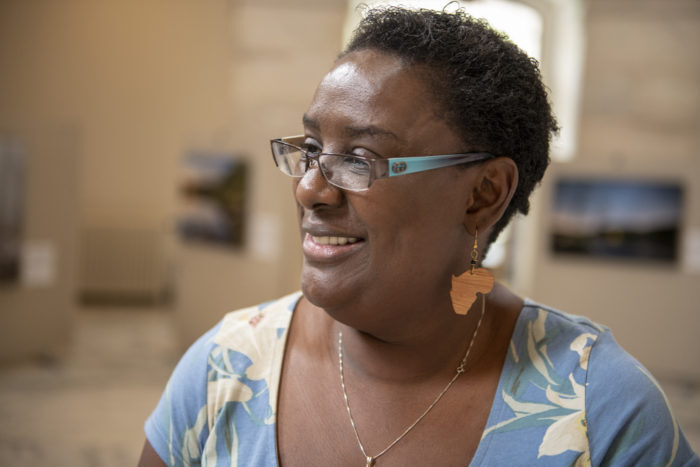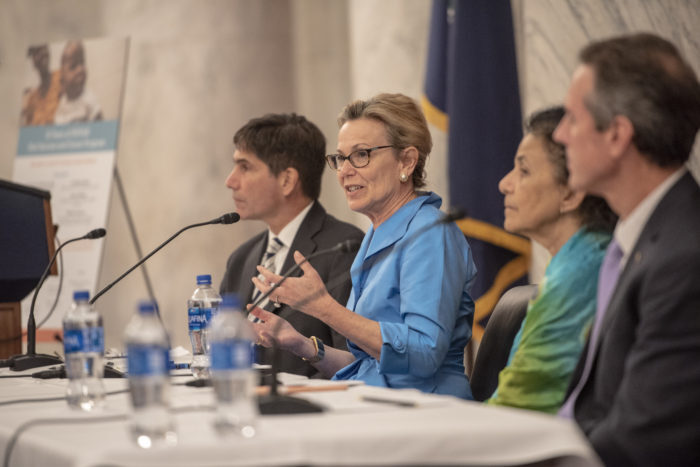As the President’s Emergency Plan for AIDS Relief (PEPFAR) celebrates its 15th anniversary this year, the Elizabeth Glaser Pediatric AIDS Foundation (EGPAF) joined with friends in the global HIV/AIDS community to host a conversation on Capitol Hill highlighting past successes and future progress of what is often lauded as one of the most important foreign policy initiatives of the U.S. government.

The event featured two panels: one focused on the creation and early years of the PEPFAR program, and one on looking forward to how PEPFAR can evolve.
Sharing anecdotes about the origins of PEPFAR were Drs. Tony Fauci, Director of NIAID, and Mark Dybul past Global AIDS Coordinator, former Executive Director of the Global Fund, and current professor at Georgetown University—two giants in global HIV/AIDS and key players in the creation of PEPFAR. Both Drs. Fauci and Dybul reiterated the importance of political leadership in getting the program off the ground and running quickly and effectively. Dr. Fauci spoke of how former President George Bush was truly committed to addressing the disparity that those in the developing world were not accessing lifesaving HIV medicines.
Dr. Dybul noted it was not a foregone conclusion that PEPFAR would work—in fact, a lot of the public health community said it was impossible. What was also significant, in addition to political leadership, was setting clear goals and proving that they are being met with clear data and benchmarking. Leadership coupled with ambitious goals kept those working on PEPFAR (at all agencies and levels of government) on track working towards shared outcomes.
Also joining the panel was EPGAF Ambassador Martha Cameron. Martha spoke passionately about the burden HIV has taken on her family and community in Zambia, her home country. She also reiterated the transformational power of the program in helping turn the tide on the epidemic. Martha told guests that when she was diagnosed with HIV she was incredibly sick, and her mother had already died. “We had no hope until 2003 when we got the lifesaving drugs.” It was not just that the PEPFAR program ensured Martha would live a healthy life, it also enabled her to realize her dream of having a family. “Not having children would have killed me more than the HIV. When the doctor told me that there was a program and that I could deliver my children safely and free of HIV, it was one of the most beautiful moments of my life.”

When the doctor told me that there was a program and that I could deliver my children safely and free of HIV, it was one of the most beautiful moments of my life. Martha Cameron, EGPAF Ambassador
Building on the first panel, current Global AIDS Coordinator, Ambassador Debora Birx, joined President and CEO of Catholic Relief Services (CRS), Sean Callahan; and Dr. Wafaa El-Sadr, Director of ICAP at Columbia University, to discuss moving the program into the future.

Dr. Birx spoke on working to achieve epidemic control in 13 focus countries, but also taking lessons learned to all of the 23 high burden countries where PEPFAR works. She noted that it goes beyond funding. Governments and their policies in those countries impact success on the ground, and local buy-in and partnerships are central to see programmatic and scientific advancements become breakthroughs for communities.
Building on Dr. Birx’s comments, Dr. Sadr advised that moving forward the global community needs to look for key places to invest that are promising. Investing in young women through DREAMS has shown successful, and we need to do the same for young men—starting with the new MenStar initiative. She emphasized that PEPFAR works in countries that are not only thirsty for new discoveries but are also willing and able to rapidly scale up those discoveries to put new science into action. PEPFAR’s success is not about small numbers, it’s about reaching everyone that needs to be reached with the latest innovations in HIV science and service delivery.
Lastly, Mr. Callahan emphasized the critical role that Faith-based Organizations (FBOs) will play as PEPFAR looks towards the future. Organizations like CRS are important to translating these programs down to communities at the lowest level, with the ability to reach the furthest communities or remote villages that others may not reach. Stigma remains a challenge in these communities, and he noted we need to strengthen the capacity of communities so they address stigma and other barriers that remain.
Congressional leadership is crucial to PEPFAR results through continued robust funding and oversight. Having this conversation on Capitol Hill reinforces the critical role Congress has played in creating the groundbreaking program but also their important leadership moving forward.
We cannot take our foot off the gas pedal if we are going to get to the end of the AIDS epidemic.
View more photos from the event on our Facebook page.






